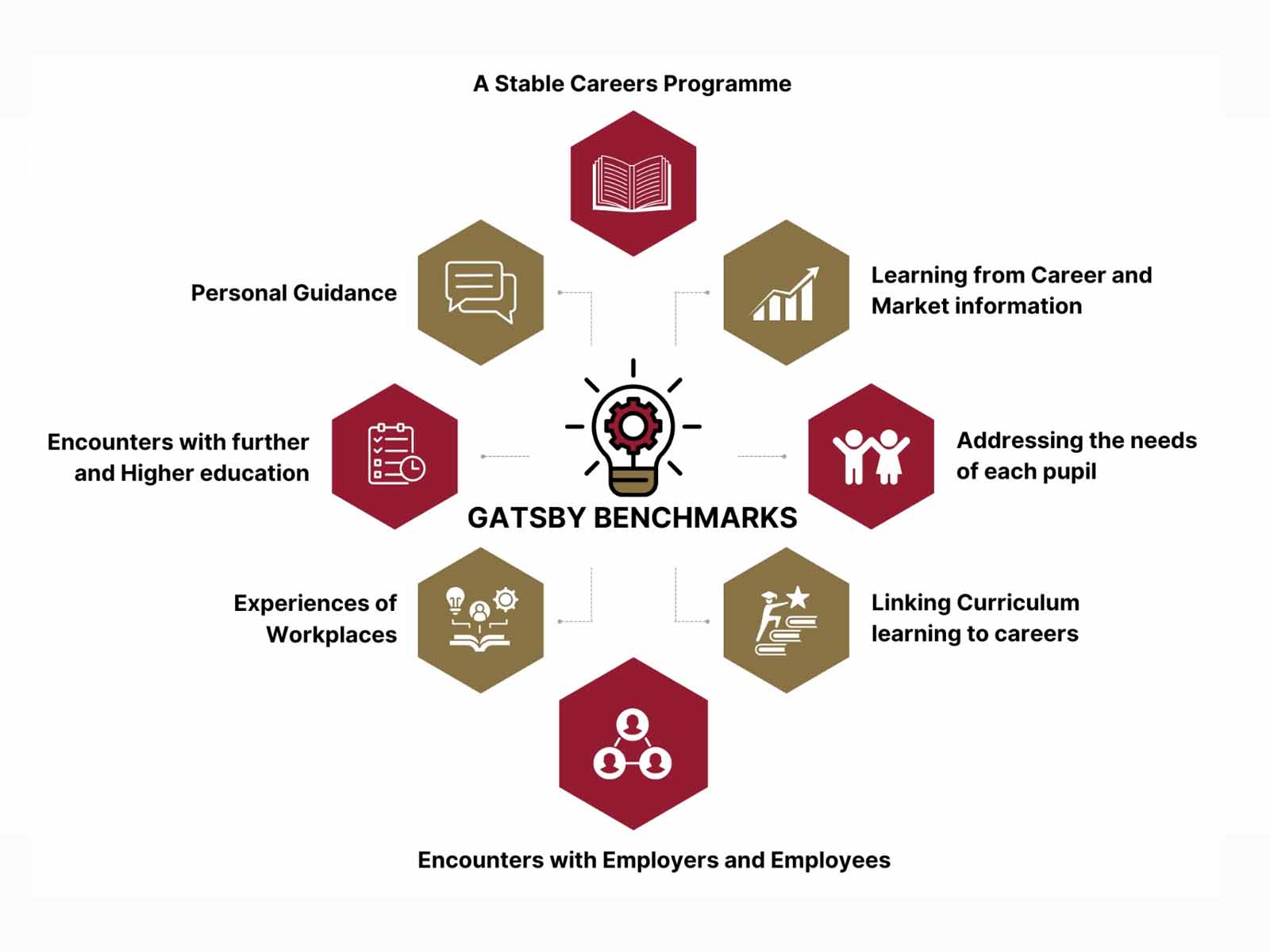Careers and pathways at DGPS

At Dove Green Private School in Dubai, we aim to provide students with a comprehensive and forward-thinking careers program. The key framework we follow is the Gatsby Benchmarks, widely recognized as the gold standard for career guidance in education.
But what are the Gatsby Benchmarks, where did they come from, and why are they important?
The benchmarks were introduced in 2014 through a Good Career Guidance research report by the Gatsby Charitable Foundation. This report was led by Sir John Holman, a Professor of Chemistry, educationalist, and former headteacher, who was appointed by Lord Sainsbury to oversee the project. Sir John and his team conducted extensive international research to identify best practices in career guidance, drawing on evidence from high-performing education systems worldwide. Their work culminated in the creation of eight key benchmarks, designed to provide a framework for delivering effective career education in schools.
These benchmarks have since become a cornerstone of careers education, offering a clear and actionable structure for schools to follow. At Dove Green Private School, they play a significant role in shaping our careers strategy, ensuring our students are well-prepared for their futures.
The 8 Gatsby Benchmarks:
- A Stable Careers Programme
- A structured and consistent careers education program that is embedded across the school.
- Learning from Career and Labour Market Information
- Access to up-to-date information about careers and the job market to make informed decisions.
- Addressing the Needs of Each Student
- Personalized guidance and support tailored to individual aspirations and needs, with a focus on inclusion (Emirati students, boys, girls, SEND, G&T).
- Linking Curriculum Learning to Careers
- Embedding career relevance in subject teaching, demonstrating the real-world application of classroom learning.
- Encounters with Employers and Employees
- Opportunities for students to interact with professionals to understand different career paths.
- Experiences of Workplaces
- Hands-on experience in real-world working environments to develop practical skills.
- Encounters with Further and Higher Education
- Exposure to university and vocational opportunities to broaden horizons and inform choices.
- Personal Guidance
- One-on-one support from a qualified careers advisor to help students plan their futures.
These benchmarks are integrated into our careers program to empower our students with the tools, knowledge, and experiences they need to succeed in a rapidly changing world. Our commitment to meeting these benchmarks, grounded in the research led by Sir John Holman, ensures we are preparing students not only for their next steps but for a lifetime of opportunities.
We implement these benchmarks at every stage of a student’s journey, brining the Gatsby Benchmarks to life through practical and meaningful activities tailored to each key stage. Here is an overview examples how this is achieved:
Key Stage 1 (Ages 5-7)
- Linking Curriculum Learning to Careers: Using role-play and story-based learning, students explore careers such as doctors, scientists, and engineers through themed weeks and classroom projects.
- Encounters with Employers: Inviting parents and local professionals to speak about their jobs during “Career Day” events.
Key Stage 2 (Ages 7-11)
- Learning from Career and Labour Market Information: Introducing simple concepts like the roles of different professions and local industries using interactive activities.
- Experiences of Workplaces: Arranging visits to community businesses, such as bakeries, farms, or technology hubs, to help students understand the workplace.
Key Stage 3 (Ages 11-14)
- Addressing the Needs of Each Student: Career aptitude assessments to help students identify their strengths and interests, with tailored advice provided during one-on-one guidance sessions.
- Encounters with Employers and Employees: Hosting industry-specific panel discussions where students can interact with professionals from various fields.
- Linking Curriculum Learning to Careers: Encouraging subject teachers to integrate career relevance, such as exploring the engineering behind structures in math or environmental careers in science.
Key Stage 4 (Ages 14-16)
- Experiences of Workplaces: Students and families are supported with engaging with local businesses to give students first-hand experience in their areas of interest.
- Personal Guidance: Regular one-on-one career counseling to support students in selecting appropriate GCSEs or vocational pathways aligned with their future aspirations.
- Encounters with Further and Higher Education: Organising visits to universities and technical colleges to inspire students about their next steps.
Key Stage 5 – from August 2025 (Ages 16-18)
- Careers and Pathways: Providing access to internships and extended work experience placements tailored to both academic and vocational aspirations.
- Personal Guidance: Dedicated career advisors help students navigate university applications, vocational qualifications, and career goals.
- Encounters with Further and Higher Education: Collaborations with universities for workshops, mock interviews, and admissions seminars.
These activities ensure our students experience a well-rounded, progressive, and inclusive approach to career education. Through the Gatsby Benchmarks, we empower students at every key stage to see the connections between their education and the world beyond the classroom, helping them build aspirations and confidence in their futures.

